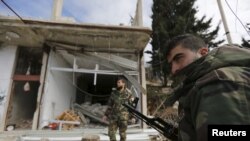Syrian President Bashar al-Assad says a proposed cease-fire would be "difficult" to implement, and accused Turkey and Saudi Arabia of being directed by powers abroad.
Speaking Monday in Damascus, Assad said Turkey and Saudi Arabia have long wanted to send troops into his country, but are "only followers that carry out orders." He said the five-year war in Syria has been an international conflict since its first few months.
Both Turkey and Saudi Arabia are taking part in U.S.-led airstrikes against Islamic State targets in Syria, and have signaled their willingness to send in ground troops, but have not deployed any troops inside Syria.
Meanwhile Turkey has conducted cross-border airstrikes on Kurdish fighters in northern Syria since Saturday and warned of a "harsh response" if Kurdish-led forces do not retreat from their positions near the border.
The Kurdish YPG militia has taken over large amounts of territory from Islamist rebels along Syria's border with Turkey in recent days, exploiting a Russian-backed Syrian government offensive against the rebels.
The YPG advance has alarmed Turkey. It accuses the group of having links to the PKK, a Kurdish rebel group viewed as a terrorist group by Ankara, and worries the Kurds may be trying to set up a separate region along the border.
Turkish Prime Minister Ahmet Davutoglu on Monday said his country will not let Kurdish fighters take the town of Azaz, located only a few kilometers south of Turkey. He warned if the Kurds do not withdraw from a nearby air base then Turkish forces will make it "unusable."
But it is not clear that Turkish airstrikes will stop the Kurdish advance. On Monday, the Kurdish-led Syrian Democratic Forces (SDF) - an alliance that also includes Arab groups - was making gains in Tel Rifaat, one of the Islamist rebels' last remaining bastions in the region.
The SDF now controls more than two-thirds of Tel Rifaat, according to the Syrian Observatory for Human Rights, a Britain-based war monitoring group that relies on a network of contacts on the ground in Syria.
Diplomats in New York said Monday that Russia has asked the UN Security Council to hold discussions on Turkish military actions in Syria and Iraq. Russia has not commented.
The fighting underscores the complicated nature of the conflict in Syria, where fighting has killed hundreds of thousands of people and created millions of refugees over the past four and a half years.
Turkey is opposed to the Assad government and has aided various rebel groups fighting against him. But it also opposes Kurdish fighters, who have been fighting a decades-long battle for autonomy in Turkey.
Further complicating matters, the YPG Kurdish militia group is backed by the United States, a key ally of Turkey. Washington has called for Turkey to scale back its campaign against the Kurds, but Ankara appears to be undeterred.
In a phone call this week with Prime Minister Davutoglu, U.S. Vice President Joe Biden "noted U.S. efforts to discourage Syrian Kurdish forces from exploiting current circumstances to seize additional territory near the Turkish border," according to a White House statement.
But Biden also urged Ankara to "show reciprocal restraint by ceasing artillery strikes in the area," the statement said.
Turkey's foreign ministry said Monday the statement was received with "astonishment," since it put U.S. "ally Turkey and a terrorist organization in the same equation." The ministry also insisted Turkey would continue its airstrikes, which it has portrayed as being retaliatory.
The fighting comes as major powers try to implement a temporary cessation of hostilities this week. The cease-fire is set to begin this week, and is meant to allow humanitarian agencies to disperse badly needed emergency aid.
The pause in fighting is also meant to create space for the resumption of international peace talks, which collapsed earlier this month, in part because of a massive Russian-backed Syrian government offensive.





